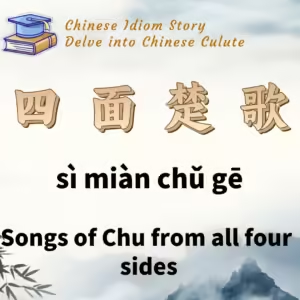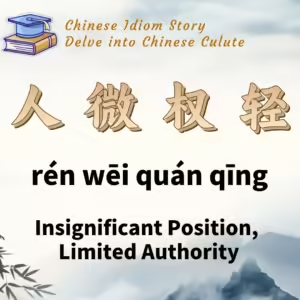
Chinese Idiom: 四面楚歌 (Si Mian Chu Ge)
English Translation: Songs of Chu from all four sides
pīn yīn: sì miàn chǔ gē
Idiom Meaning: To be in a desperate and surrounded situation, facing enemies on all sides, or to be isolated and without support.
Historical Source: Records of the Grand Historian (《史记·项羽本纪》) by Sima Qian.
Idiom Story:
During the Chu-Han Contention, the powerful Chu general Xiang Yu initially had the upper hand over Liu Bang. However, Liu Bang’s strategic acumen and effective leadership allowed him to steadily build his strength and ultimately push Xiang Yu into a series of retreats.
In December of the fifth year of Han Wen Emperor (around 202 BCE), Xiang Yu found himself cornered at Gaixia (near present-day Lingbi, Anhui). Surrounded by Liu Bang’s forces, Xiang Yu’s troops were greatly reduced, and their supplies were exhausted. On a cold winter night, while lying in his tent contemplating how to escape, Xiang Yu was startled to hear the enemy troops singing songs from his homeland of Chu from all directions. This led him to believe that Liu Bang had completely conquered Chu and that his troops were made up of Chu people.
Realizing his position was hopeless, Xiang Yu chose to drink wine in his tent. He had a deep affection for his concubine, Yu Ji, and his prized horse, the Black Steed. In a melancholic mood, Xiang Yu composed and sang a mournful song:
“力拔山兮气盖世,时不利兮骓不逝。 骓不逝兮可奈何,虞兮虞兮奈若何?”
The song expressed his despair and sense of futility:
“With strength to lift mountains and a spirit that overwhelms the world, But the time is not right, and the steed cannot gallop, What can be done if the steed cannot gallop, Oh Yu Ji, what can I do about you?”
Xiang Yu sang this song repeatedly, with Yu Ji joining in, and tears flowed down his face. His followers also wept quietly, deeply moved by his sorrow.
The following day, Xiang Yu attempted a desperate breakout but ultimately met his end by the banks of the Wu River, choosing to commit suicide rather than be captured.
This tragic episode became synonymous with being trapped and isolated, leading to the idiom “四面楚歌”.






